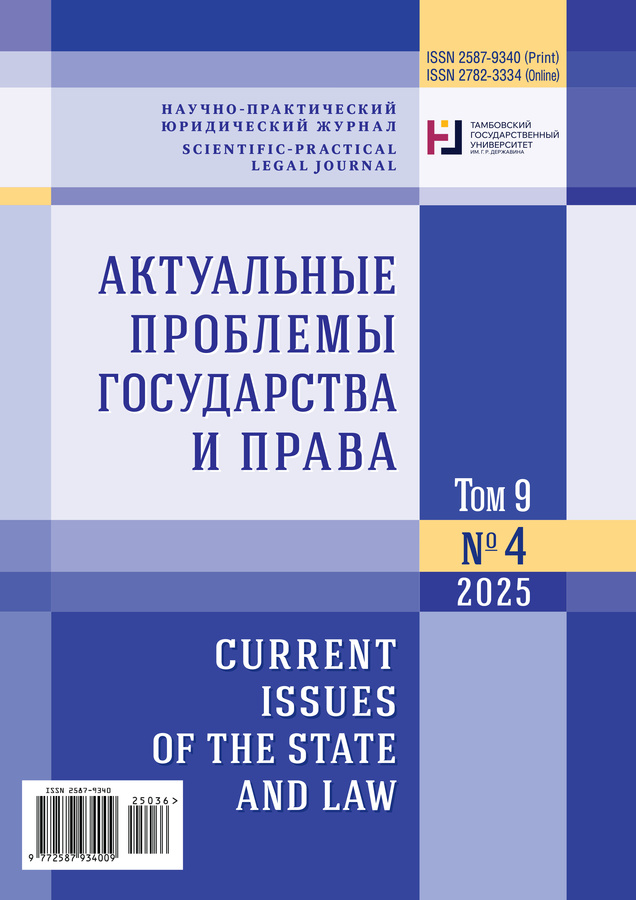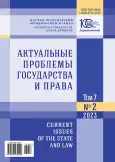Экономическая безопасность Российской Федерации в свете криминализации экономических отношений
- Авторы: ВОРОБЬЁВА С.В.1
-
Учреждения:
- ФГБОУ ВО «Тамбовский государственный университет им. Г.Р. Державина»
- Выпуск: Том 7, № 2 (2023)
- Страницы: 249-262
- Раздел: Материальное право
- URL: https://journal-vniispk.ru/2587-9340/article/view/303484
- ID: 303484
Цитировать
Аннотация
Одними из наиболее актуальных вопросов обеспечения национальной безопасности России выступают вопросы укрепления ее экономической составляющей, то есть экономической безопасности. От уровня экономического развития государства зависит не только благополучие граждан внутри государства, но и стабильное положение государства на международной арене. Цель исследования – рассмотреть экономическую безопасность в контексте национальной безопасности, а также определить фактор негативного влияния криминализации сферы экономики как одной из ведущих угроз экономической безопасности государства посредством применения общелогических, эмпирических и теоретических методов исследования. Отмечено, что сложность современных взаимоотношений между странами и нарушенное экономическое и политическое сотрудничество приводят к тому, что в условиях санкционной политики в отношении Российской Федерации актуализируются вопросы, связанные с обеспечением экономической безопасности в контексте стабилизации и охраны национальных интересов. Важность данного компонента подчеркнута тем, что от уровня обеспечения экономической безопасности зависит развитие и обсечение других сфер – социальной, нравственно-духовной, политической и пр. В связи с этим обеспечение экономической безопасности является одним из основных направлений деятельности государства. Также для экономической безопасности ведущей угрозой является крупномасштабная криминализация экономики, где теневой сектор, коррупционная составляющая, деформация бюджетной сферы и иные негативные процессы значительным образом наносят вред безопасности страны в социально-экономи-ческой плоскости. Проанализированы составные элементы экономической безопасности, показатели и место экономической безопасности в системе национальной безопасности Российской Федерации. Подчеркнуто, что на безопасность государства и благосостояние общества разрушительное влияние оказывает криминализация экономической сферы.
Об авторах
Светлана Викторовна ВОРОБЬЁВА
ФГБОУ ВО «Тамбовский государственный университет им. Г.Р. Державина»
Автор, ответственный за переписку.
Email: vorob-sveta@yandex.ru
ORCID iD: 0000-0003-1059-2065
кандидат юридических наук, доцент, доцент кафедры уголовного права и процесса Института права и национальной безопасности
Россия, Российская Федерация, 392000, г. Тамбов, ул. Интернациональная, 33Список литературы
- Малюгина Т.В. Формирование системы управления экономической безопасностью предприятия // Молодой ученый. 2020. № 35 (325). С. 49-54. https://elibrary.ru/irgpzc
- Васильева С.П. Экономическая безопасность: определения и сущность // Журнал прикладных исследований. 2020. № 3. С. 6-13. https://doi.org/10.47576/2712-7516_2020_3_6, https://elibrary.ru/umuydn
- Воробьева С.В. К вопросу об укреплении суверенности российской государственности // Актуальные проблемы государства и права. 2017. Т. 1. № 3/4. С. 48-57. https://elibrary.ru/yohrmc
- Табаков А.В. Содействие внешнеэкономической деятельности и обеспечение экономической безопасности России: в поисках баланса частных и публичных интересов // Вестник Российской таможенной академии. 2013. № 4. С. 25-34. https://elibrary.ru/robklv
- Лукашин В.И. Экономическая безопасность. М.: Моск. гос. ун-т экономики, статистики и информатики, 1999. 134 с. URL: https://search.rsl.ru/ru/record/01000626155
- Орехов В.И. Экономическая безопасность современной России в условиях кризиса. М.: ИНФРА-М, 2014. 105 с. URL: https://search.rsl.ru/ru/record/01006747012
- Уразгалиев В.Ш. Экономическая безопасность. М.: Юрайт, 2019. 675 с. https://elibrary.ru/rboeep
- Морозова Л.А. Правовые приоритеты в экономической политике современной России // Актуальные проблемы государства и права. 2019. Т. 3. № 12. С. 423-431. https://doi.org/10.20310/2587-9340-2019-3-12-421-431, https://elibrary.ru/ndnqus
- Колобаев А.В. Формирование системы обеспечения экономической безопасности предприятия // Международный журнал гуманитарных и естественных наук. 2017. № 4. С. 35-41. https://elibrary.ru/zwjjrh
- Крутиков В.К., Дорожкина Т.В., Костина О.И., Якунина М.В. Экономическая безопасность. Калуга: Изд-во «Эйдос», 2017. 196 с. https://elibrary.ru/tpipij
- Васильев В.Л. Уровни экономической безопасности: анализ методических подходов // Вестник Казанского технологического университета. 2014. Т. 17. № 18. С. 273-279. https://elibrary.ru/sxyhxt
- Криворотов В.В. Экономическая безопасность государства и регионов. М.: Юнити-Дана, 2012. 350 с. URL: https://search.rsl.ru/ru/record/01006530351
- Золаев Э.А. Экономическая безопасность государства: понятие и угрозы цифровизации // Экономическая безопасность. 2022. № 2. Т. 5. С. 571-582. https://doi.org/10.18334/ecsec.5.2.114826, https://elibrary.ru/onalca
- Ечмаков С.М. Теневая экономика: Анализ и моделирование. М.: Финансы и статистика, 2004. 405 с. https://elibrary.ru/qqilgh
- Мациевский Н.С. Теневая Россия: истоки, сущность, причины, последствия. Томск: Красное знамя, 2015. 533 с. URL: https://www.chitalnya.ru/work/1656292/ (дата обращения: 20.12.2022)
- Черемных О.А. Экономические преступления в Российской Федерации как угроза ее экономической безопасности // Экономика и предпринимательство. 2019. № 11 (112). С. 117-122. https://elibra-ry.ru/jhvvhn
- Дадалко В.А., Тюкина У.Е. Влияние теневого сектора экономики на национальную безопасность России // Национальные интересы: приоритеты и безопасность. 2019. Т. 15. № 3 (372). С. 521-532. https://doi.org/10.24891/ni.15.3.521, https://elibrary.ru/yzinsx
- Кузнецова Е.И. Экономическая безопасность и конкурентоспособность. Формирование экономической стратегии государства. М.: Юнити-Дана, 2020. 240 с. https://elibrary.ru/rbcbsp
- Ечмаков С.М. Теневая экономика: Анализ и моделирование. М.: Финансы и статистика, 2004. 405 с. https://elibrary.ru/qqilgh
- Воробьева С.В., Волков И.А. Некоторые проблемы квалификации преступлений, связанных со злоупотреблением и превышением должностных полномочий // Актуальные проблемы государства и права. 2020. Т. 4. № 14. С. 206-209. https://doi.org/10.20310/2587-9340-2020-4-14-206-215, https://elibrary.ru/sdrbzi
- Фрунзеева А.Н., Фрунзеева Ж.Н. Коррупция как угроза экономической безопасности // Вестник науки и образования. 2019. № 9-4 (63). С. 52-55. https://elibrary.ru/zpvhsp
Дополнительные файлы









